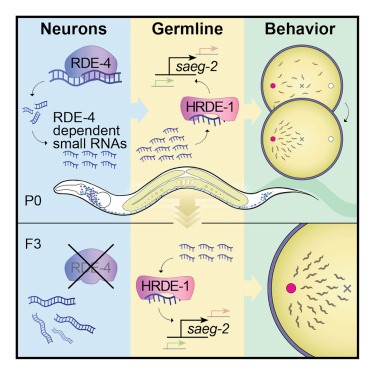Our engineered strains were cited in Cell
2019-06-13 18:39
In June 2019, Oded Rechavi and his research group of Tel Aviv University published the latest research results in Elsevier's publication Cell. This paper was entitled "Neuronal Small RNAs Control Behavior Transgenerationally" . Dr.Rechavi ordered the strains saeg-2(syb776)and saeg-2(syb777) from SunyBiotech to serve as supportive materials to the paper.
Highlights
l C. elegans neuronal small RNAs are characterized by RNA sequencing
l RDE-4-dependent neuronal endogenous small RNAs communicate with the germline
l Germline HRDE-1 mediates transgenerational regulation by neuronal small RNAs
l Neuronal small RNAs regulate germline genes to control behavior transgenerationally
Brief introduction
It is unknown whether the activity of the nervous system can be inherited. In Caenorhabditis elegans nematodes, parental responses can transmit heritable small RNAs that regulate gene expression transgenerationally. In this study, we show that a neuronal process can impact the next generations. Neurons-specific synthesis of RDE-4-dependent small RNAs regulates germline amplified endogenous small interfering RNAs (siRNAs) and germline gene expression for multiple generations. Further, the production of small RNAs in neurons controls the chemotaxis behavior of the progeny for at least three generations via the germline Argonaute HRDE-1. Among the targets of these small RNAs, we identified the conserved gene saeg-2, which is transgenerationally downregulated in the germline. Silencing of saeg-2 following neuronal small RNA biogenesis is required for chemotaxis under stress. Thus, we propose a small-RNA-based mechanism for communication of neuronal processes transgenerationally.
Figure

SunyBiotech is specializing in providing precise genome edited C. elegans. All strains generated by SunyBiotech will be named under SUNY’s nomenclature. PHX and syb is the strain designation and allele designation, respectively. We will continue working hard to provide high-quality services with higher efficiency.



